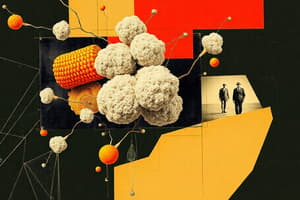Podcast
Questions and Answers
What is galactose primarily known as a subunit of?
What is galactose primarily known as a subunit of?
- Maltose
- Fructose
- Lactose (correct)
- Sucrose
Which statement is true regarding fructose?
Which statement is true regarding fructose?
- It is less sweet than glucose.
- It is a non-reducing sugar.
- It does not convert into glucose in the body.
- Its accumulation can lead to hereditary fructose intolerance. (correct)
What characterizes a racemic mixture?
What characterizes a racemic mixture?
- It can rotate plane polarized light to the right.
- It is optically inactive. (correct)
- It contains unequal amounts of dextrorotatory and levorotatory isomers.
- It consists only of levorotatory isomers.
Which sugars are classified as dextrorotatory?
Which sugars are classified as dextrorotatory?
What determines the optical activity of a sugar?
What determines the optical activity of a sugar?
What differentiates monosaccharides from oligosaccharides?
What differentiates monosaccharides from oligosaccharides?
Which of the following accurately describes polysaccharides?
Which of the following accurately describes polysaccharides?
Which type of carbohydrate classification includes glucose and fructose?
Which type of carbohydrate classification includes glucose and fructose?
What is the primary function of ribose in the body?
What is the primary function of ribose in the body?
Which classification would a sugar with 5 carbon atoms and an aldehyde group fall under?
Which classification would a sugar with 5 carbon atoms and an aldehyde group fall under?
What is a medical significance of glucose?
What is a medical significance of glucose?
Which of the following sugars is a subunit in glycoproteins?
Which of the following sugars is a subunit in glycoproteins?
How are oligosaccharides defined?
How are oligosaccharides defined?
Flashcards are hidden until you start studying
Study Notes
Carbohydrates: Definition and Classification
- Carbohydrates are aldehyde or ketone derivatives of polyhydric alcohols, or compounds that yield these derivatives upon hydrolysis.
- Monosaccharides are simple sugars containing one sugar unit and cannot be further hydrolyzed. Examples include glucose and fructose.
- Oligosaccharides contain 2-10 sugar units and yield monosaccharides upon hydrolysis. Examples include lactose and maltose.
- Polysaccharides contain more than 10 sugar units and yield monosaccharides upon acid hydrolysis. Examples include starch and glycogen.
Classification of Monosaccharides
- Classified by the number of carbon atoms: Bioses (2C), Trioses (3C), Tetroses (4C), Pentoses (5C), and Hexoses (6C)
- Further subdivided by functional group:
- Aldoses: Begin with a formyl group (H(C=O))
- Ketoses: Contain a keto group (C=O) between two carbons
Medical Significance of Monosaccharides
- Ribose: Structural component in nucleic acids (DNA, RNA) and free nucleotides (ATP).
- Glucose (grape sugar, blood sugar, dextrose): Produced by hydrolysis of starch, glycogen, sucrose, maltose, and lactose. It is fermentable, reducing, and the main sugar utilized by the body.
- Excess glucose in urine (glucosuria) is a sign of diabetes mellitus.
- Mannose: Subunit in glycoproteins and glycolipids, obtained by hydrolysis of plant gums.
- Galactose: Subunit of milk sugar (lactose), component of glycolipids, glycoproteins, and mucopolysaccharides.
- Fructose (fruit sugar): Main sugar in honey and fruits, the sweetest sugar known.
- Converted to glucose in the body, but failure of its metabolism leads to accumulation in cells and blood (hereditary fructose intolerance).
- It is a reducing and fermentable sugar, also known as the "semen sugar."
Reducing Sugar
- Any monosaccharide is a reducing sugar.
Optical Activity
- Optical activity is the ability of sugars to rotate plane-polarized light.
- Dextrorotatory (d or +): Rotate light to the right, such as glucose, galactose, and starch.
- Levorotatory (l or -): Rotate light to the left, such as fructose and invert sugar.
- Optical activity is due to the presence of asymmetric carbon atoms, carbon atoms attached to four different groups or atoms.
- A racemic mixture is a mixture of equal amounts of dextrorotatory and levorotatory isomers, resulting in no optical activity.
Studying That Suits You
Use AI to generate personalized quizzes and flashcards to suit your learning preferences.




